Thursday, May 7th 2020

AMD B550 Chipset Detailed, It's Ready for Zen 3, Older AM4 Motherboards not Compatible
In their briefing leading up to today's Ryzen 3 3100 and 3300X review embargo, AMD disclosed that its upcoming "Zen 3" 4th generation Ryzen desktop processors will only support AMD 500-series (or later) chipsets. The next-gen processors will not work with older 400-series or 300-series chipsets. This comes as a blow to those who bought premium X470 motherboards hoping for latest CPU compatibility running into 2020. At this time only B550 is available, but we expect more news on enthusiast chipsets as the Zen 3 launch date comes closer. AMD B550 is a fascinating new mid-range chipset by AMD. Launching today as a successor to the popular B450 chipset, B550 is a low-power silicon with roughly the same 5-7 W TDP as the older 400-series chipset. Although AMD won't confirm it, it's likely that the chipset is sourced from ASMedia. It brings a lot to the table that could draw buyers away from B450, but it also takes some away.
The AMD B550 currently only supports 3rd generation Ryzen "Matisse" processors. Ryzen 3000 "Picasso" APU are not supported. What's more, older Ryzen 2000 "Pinnacle Ridge," "Raven Ridge," and first gen Ryzen 1000 "Summit Ridge" aren't supported, either. The Athlon 200 and 3000 "Zen" based chips miss out, too. AMD argues that it ran into ROM size limitations when trying to cram AGESA microcode for all the older processors. We find that hard to believe because B450 motherboards with the latest ComboAM4 AGESA support 2nd gen and 3rd gen processors, including APUs and Athlon SKUs based on the two. On the bright side, AMD assured us (within its marketing slides for the B550), that the chipset will support upcoming processors based on the "Zen 3" microarchitecture. The company also came up with a new motherboard packaging label that clarifies that the processors won't work with the 3400G and 3200G.AMD B550 motherboards will feature partial PCI-Express gen 4.0 support. The main PCI-Express x16 slot, and one of the M.2 NVMe slots that are wired to the "Matisse" processor will be PCI-Express gen 4.0, however, all downstream PCIe lanes put out by the B550 chipset are gen 3.0. This is still a step up from 400-series "Promontory" chipsets, which are limited to gen 2.0. B550 puts out eight PCIe gen 3.0 lanes, which combine with the 20 usable processor lanes from "Matisse" to take the platform's total PCIe budget to 28 lanes (x16 gen 4.0 + x4 gen 4.0 + x8 gen 3.0). The B550 chipset itself connects to the "Matisse" processor via a PCI-Express 3.0 x4 connection.
In terms of connectivity, AMD's B550 chipset puts out up to six SATA 6 Gbps ports with AHCI and RAID capability; two each of 10 Gbps USB 3.2 gen 2 and 5 Gbps USB 3.2 gen 1 ports; and six USB 2.0 ports. PCIe, SATA, and USB connectivity from the "Matisse" processor is unchanged: four 10 Gbps USB 3.2 gen 2 ports, and up to two SATA 6 Gbps ports.The processor includes a PCI-Express 4.0 x16 PEG connection that can be split between slots. AMD is allowing motherboard designers to have multi-GPU capability with the B550, where the x16 PEG link is split between two x16 slots (electrical x8). Previously this capability was limited to the top-tier X370 and X470 boards. The processor also puts out one PCI-Express 4.0 x4 link meant to drive one M.2 NVMe slot or U.2 NVMe port. Every B550 motherboard we've seen so far features one M.2 PCIe gen 4.0 x4 (64 Gbps) slot.As with both its predecessors, the B350 and B450, the new B550 chipset enables full multiplier-based CPU overclocking, along with broad memory overclocking support. Motherboard designers are at liberty to kit out the B550 with the most elaborate CPU VRM solutions. Expect some of the pricier B550 boards to match their X570 counterparts in overclocking capability.
Motherboards based on the AMD B550 chipset are expected to launch on June 16, 2020. Prices start at $100, according to AMD.
The AMD B550 currently only supports 3rd generation Ryzen "Matisse" processors. Ryzen 3000 "Picasso" APU are not supported. What's more, older Ryzen 2000 "Pinnacle Ridge," "Raven Ridge," and first gen Ryzen 1000 "Summit Ridge" aren't supported, either. The Athlon 200 and 3000 "Zen" based chips miss out, too. AMD argues that it ran into ROM size limitations when trying to cram AGESA microcode for all the older processors. We find that hard to believe because B450 motherboards with the latest ComboAM4 AGESA support 2nd gen and 3rd gen processors, including APUs and Athlon SKUs based on the two. On the bright side, AMD assured us (within its marketing slides for the B550), that the chipset will support upcoming processors based on the "Zen 3" microarchitecture. The company also came up with a new motherboard packaging label that clarifies that the processors won't work with the 3400G and 3200G.AMD B550 motherboards will feature partial PCI-Express gen 4.0 support. The main PCI-Express x16 slot, and one of the M.2 NVMe slots that are wired to the "Matisse" processor will be PCI-Express gen 4.0, however, all downstream PCIe lanes put out by the B550 chipset are gen 3.0. This is still a step up from 400-series "Promontory" chipsets, which are limited to gen 2.0. B550 puts out eight PCIe gen 3.0 lanes, which combine with the 20 usable processor lanes from "Matisse" to take the platform's total PCIe budget to 28 lanes (x16 gen 4.0 + x4 gen 4.0 + x8 gen 3.0). The B550 chipset itself connects to the "Matisse" processor via a PCI-Express 3.0 x4 connection.
In terms of connectivity, AMD's B550 chipset puts out up to six SATA 6 Gbps ports with AHCI and RAID capability; two each of 10 Gbps USB 3.2 gen 2 and 5 Gbps USB 3.2 gen 1 ports; and six USB 2.0 ports. PCIe, SATA, and USB connectivity from the "Matisse" processor is unchanged: four 10 Gbps USB 3.2 gen 2 ports, and up to two SATA 6 Gbps ports.The processor includes a PCI-Express 4.0 x16 PEG connection that can be split between slots. AMD is allowing motherboard designers to have multi-GPU capability with the B550, where the x16 PEG link is split between two x16 slots (electrical x8). Previously this capability was limited to the top-tier X370 and X470 boards. The processor also puts out one PCI-Express 4.0 x4 link meant to drive one M.2 NVMe slot or U.2 NVMe port. Every B550 motherboard we've seen so far features one M.2 PCIe gen 4.0 x4 (64 Gbps) slot.As with both its predecessors, the B350 and B450, the new B550 chipset enables full multiplier-based CPU overclocking, along with broad memory overclocking support. Motherboard designers are at liberty to kit out the B550 with the most elaborate CPU VRM solutions. Expect some of the pricier B550 boards to match their X570 counterparts in overclocking capability.
Motherboards based on the AMD B550 chipset are expected to launch on June 16, 2020. Prices start at $100, according to AMD.
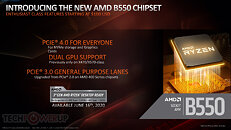
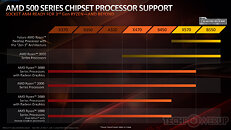
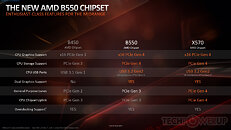
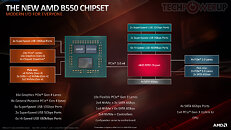
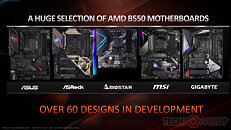
434 Comments on AMD B550 Chipset Detailed, It's Ready for Zen 3, Older AM4 Motherboards not Compatible
And before then they are a competitive secret.
At the end of the day they make what they can of the millions of chips and sell that then when they know what they Will do.
And then board maker's do whatever makes commercial sense not normally to help the user
With not owning one at least you can choose still chill..
Another thing if you bought a 3600X thinking of upgrades you do still have options ,a 3950X if you got that your probably sticking a year at least.
i don't feel the urge to upgrade the board - don't use any pcie 4 device & especially X570 all with daisy chain memory, don't think i wanna shell out money just to test em out like i did when AM4 first comes out
This might be the case for us X400 series owners once Zen3 finally comes out. I have my fingers crossed :D I'm going to take a guess that the Zen3 chips will support higher RAM frequency and that the x400 series boards will have a hard time to enable whatever frequency is the base for Zen3. That's if the Zen3 chips will work in x400 series boards we have to all wait and see. If not well I have my eye on the 3950x to drop in, and I'm sure a price drop once Zen3 comes out. Would also like to add that it has 16 Power Phase design capable of providing extra 300W for CPU. I'm sure this is overkill for Zen3 and AMD knows that the 400 series will support Zen3 but they want everyone to buy a new mobo. They are still not as bad like Intel, yet :D Yet being the key word lol
www.overclock3d.net/news/cpu_mainboard/amd_s_zen_4_ryzen_5th_gen_cpus_will_likely_require_a_new_socket_-_they_told_us_in_2017/1
The PR slide at the bottom of the second one shows up to 2020 and there's an asterisk.
no longer will they have to worry if the next chip will still on work on the current mobo. no your mobo will only be good fore a few months. then you have to buy a new one.
I really feel that intel fanboys have stockholm syndrome.
No mather how many stinky dumps intel takes on them, their bone to pick is still with the , now, far superior, AMD products.
The lesson is to always read what's written in small. They did say that it might change, we just didn't bothered to read what was written in small. Sadly, you can't make marketing with " You may or may not upgrade your CPU without buying a new motherboard". That kind of message written in big just doesn't inspire confidence.
------------------
- 16 Power Phase design
- Capable of providing extra 300W for CPU
- Supports ASRock Hyper BCLK Engine II
- 256Mb AMI UEFI Legal BIOS with GUI support
AsRock x570:
------------------
- 14 Power Phase design
- Capable of providing extra 300W for CPU
- Supports ASRock Hyper BCLK Engine II
- 256Mb AMI UEFI Legal BIOS with GUI support
Both have the same size BIOS and the x470 has a higher power phase design.
Something ain't right lol. This looks like to me that AMD wants to push their PCI-e 4.0 on the 500 series boards and now make up some BS that Zen3 won't support 400 or even 300 series.
Heres to hoping by the time Zen3 comes out the mobo vendors will have their own BIOS that will support Zen3 on 400 or maybe even 300 series mobo's.
The part thats even worse is I have built many clients Computers all mainly on the B450 motherboards and saying to all my clients you be fine all the way through till the end of 2020, got yrs of upgrades to choose from, now I look like a total lair!
The whole BIOS thing is complete and utter BS, you only ever update your BIOS for when a new CPU comes out so your mobo can support it, you dont ever need to update your BIOS to go backwards in CPU's lol you only do it for upgrades.....so if a new BIOS was out and it removed support for older Gen 1 Ryzen CPU's then who cares! your not going backwards anyway, and if you ever do for some reason go backwards then flash it back, not hard!
isn't Ryzen 4000 series just a refresh of the current 3000 series? that work in 90% of all boards? so what gives!
Ryzen 4000 is about to redefine the competitive landscape with groundbreaking IPC, clock uplifts, and better gaming and much better overall performance and offerings.
Haha nice one! naturally its going to be better......but ground breaking? I dont think so.
Also remember Ryzen 4xxx would first start with the (zen2) APUs so technically you'd be (partially?) covered. Anyway the point is an upgrade to Zen 2, say 3950x, from Zen or Zen+ chips is a major leap & something like 4950x would be better though not necessarily more than 10-20% faster on avg than the current MSDT king. On the other hand 3950x will come down in price appreciably over the course of its lifetime, if history is anything to go by.